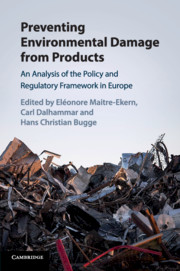 Preventing Environmental Damage from Products
Preventing Environmental Damage from Products Book contents
- Reviews
- Preventing Environmental Damage from Products
- Preventing Environmental Damage from Products
- Copyright page
- Dedication
- Contents
- Figures
- Tables
- Contributors
- Acknowledgements
- Abbreviations
- 1 Developing Legislation to Prevent Environmental Damage from Products
- Part I Structural Issues Associated with Regulating the Life Cycle of Products
- Part II Challenges Related to the Application of European Product Law
- Part III Conclusion by the Editors
- Index
1 - Developing Legislation to Prevent Environmental Damage from Products
A Herculean but Necessary Task
Published online by Cambridge University Press: 21 April 2018
- Reviews
- Preventing Environmental Damage from Products
- Preventing Environmental Damage from Products
- Copyright page
- Dedication
- Contents
- Figures
- Tables
- Contributors
- Acknowledgements
- Abbreviations
- 1 Developing Legislation to Prevent Environmental Damage from Products
- Part I Structural Issues Associated with Regulating the Life Cycle of Products
- Part II Challenges Related to the Application of European Product Law
- Part III Conclusion by the Editors
- Index
Summary
- Type
- Chapter
- Information
- Preventing Environmental Damage from ProductsAn Analysis of the Policy and Regulatory Framework in Europe, pp. 1 - 20Publisher: Cambridge University PressPrint publication year: 2018
- 4
- Cited by
